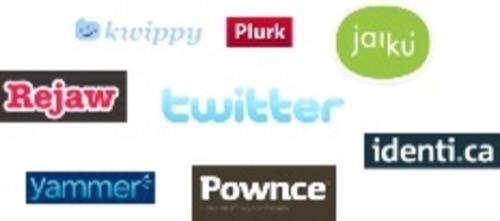Not too long ago, there were some grumblings about the state of the tech blogosphere and the industry in general. By spending so much time reading Techmeme, Twitter, FriendFeed, and the like it’s easy to get the impression that some of the most influential people in our industry today were less interested in the technology they were reviewing than they were in making a name for themselves as some sort of navel-gazing superstar. Not only that, the apps that people were fawning over were often not the kind of apps that had mainstream appeal or were solving real problems. It was as if the whole crowd was shouting at each other, trying to be heard over the noise and patting each other on the back for being so hip with all our shiny, social media-flavored toys.

Was this what the tech industry had come to, I wondered? No, that was just what the tech blogosphere had come to. This year’s DEMO conference proved to me that technology innovation is still alive and well.
Social Media Apps Aren’t All We Have!
There have been some questions rattling around in the back of my mind for a while now about the tech industry. Why are so few apps crossing the chasm to achieve mainstream appeal these days?, I wondered. Besides Twitter, have we seen many apps become breakout hits? (And I’m counting Twitter because CNN is pretty mainstream in my book). And even more important than mainstream appeal, are any apps solving real-world problems? Do startups even exist anymore that are addressing these types of things? Or was everyone just trying to re-invent Twitter a million times over?

Now, don’t get me wrong, I adore web apps, social media, and Web 2.0, but do I think that all my personal toys will hold the same level of fascination for everyone? No. A large part of the world is still quite happy spending only portions of their lives online, not every day, day-in, day-out. (I know, it’s shocking.) Getting these people enthusiastic about technology means we need to start addressing some of the issues that they have today. In doing so, we can have a much bigger impact on the world as a whole.
Solving Real-World Problems Is What DEMO Does Right
One of the most prevalent themes that emerged from DEMO was that many the startups presenting there were really thinking about the problems people face when dealing with technology. I don’t recall any presentations whose pitch was: “It’s like ___________, but for __________.” Instead, they were presenting new ideas. Some of the things truly blew me away: a single sign on for the web? Amazing. A portable plastic e-ink display as thin as a pad of paper? Incredible. Tools that extend the power of democratization to artists and introduce new ways for them to actually make money again? Awesome.
DEMO Statups Are Forward-Thinking
Not only were there startups addressing real-world issues, there were others thinking ahead to the future. Take for example, Tikitag, who was building “an internet of things” using RFID chips. Or SemantiFind who built a semantic search engine on top of Google. Or Echo Nest, a developer site that aims to power the future of music. These things aren’t sure bets – they’re apps for the world of the future. You want to see what emerging technology really looks like? Just look around DEMO.
Themes From This Year’s DEMO
Mobile Is Everywhere
There were a few themes that jumped out at me from the conference. One: mobile is hot. So many applications and solutions were either addressing a need had by mobile users of were at least incorporating a mobile offering to complement their app. And the one question everyone wanted to know when reviewing a mobile app was “will it be on the iPhone?” (Companies: Rocketron, Clintworld, Dial Directions, Maverick Mobile Solutions, Pvt. Ltd., SkyData Systems, Inc., G.ho.st, Message Sling, WebDiet,Inc., Xumii, Inc.)

The Web Democratizes Everything
Another theme was the re-invention of the business model for online artistry. From online films, to music, to photography, companies were trying to create strategies that would finally help indie artists make money again. Not only were there sites that offered revenue opportunities, there were also new professional-level tools being delivered to everyone, too. Similar to how CMS systems like WordPress let everyone become a publisher, these new tools can help everyone can publish and distribute their music, films, and photos. (Companies: MeDeploy, MixMatchMusic, Ltd., Photrade, The Echo Nest Corp.)
Social networking is, in fact, “like air.”
We’ve passed the point where tools are being described as “a social network for ______.” If a site is an online community, you can now assume that it will incorporate the social networking aspects that you have come to expect: profiles, friend lists, etc. The difference is that now, more people are giving thought to how their site’s social networking feature should more accurately reflect real-world relationships. The ubiquitous “friend” is on its way out to be replaced by levels of friendship and familiarity along with which various levels of access are permitted. (Companies: Giftag, Familybuilder, Koollage, Paidinterviews, TravelMuse, TurnTo Networks)

Team Collaboration Is An Ever-Growing Space
You’ve heard the term “Enterprise 2.0” a lot lately because this is an area that’s really taking off. Several companies are trying to address the needs of team collaboration and each one of them has their own take on how to do it the best. Will we soon have hundreds of team collaboration suites to choose from or will a few clear winners emerge? We’ll just have to wait and see. (Companies: Creately, crowdSPRING, DOCCENTERMeWorks, OpenACircle.com, Toolgether)
We Need More Ways To Find Online Videos
There are more places to watch online video today than ever before. Several of the companies at DEMO were attempting to organize the vast amounts of online video into an easy-to-use interface so we can find, watch, and share more of the videos that are out there on the net. Others want to make it easier to watch videos on any device. Video is going to be a big part of the net’s future, so we need more innovation in recommendation engines and more standardization of video formats so we can move video across devices.(Companies: Awind Inc, beeTV, ffwd.com, Inc., Invision TV, LLC, RealNetworks, RemoTV)


















